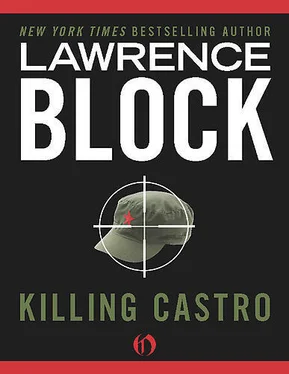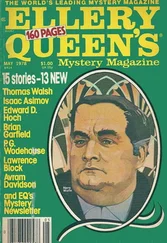Hines said: “I’m not chickening out. You can’t scare me, damnit. You give me a load of crap about the chance of getting away. You think I don’t know that? You think I haven’t been over it a hundred times in my mind? I figure I have one chance in ten of getting away from the plaza. God knows what kind of chance I have of getting out of Cuba; I haven’t even bothered thinking about that part of it yet. I can’t let myself think any further than killing Castro. I can’t afford to. Whatever happens afterward will happen, and that’s all. But don’t try to scare me. It won’t work.”
Turner didn’t say anything for a minute or two. He lit another cigarette, smoked in silence.
Then he said: “I didn’t mean to get on your back, Jim.”
“I know.”
“I was trying to make it easier. Not harder.”
“I know that.” Hines turned away. “You want to make me save myself. I understand. And I’m sorry I called you chicken. That’s a pretty silly word, isn’t it? I don’t know anything about courage, Turner. About bravery, heroism, all that jazz. Sometimes I get the feeling that there’s no such thing as a brave man. A guy does what he has to do and no more. You’ve got an out now. You can stay in Cuba and enjoy yourself. Without that out you’d be braver than hell. If you’ve got a guy cornered then he’s brave. I guess that’s the way it works.”
“Maybe, Jim.”
Hines studied the floor, shifted his weight from one foot to the other. “You want to know something? I’m not even sure any more if I’m getting back at… at Castro because of Joe. Joe was always my big hero, you know, and I had this image of the little brother evening things up for the big brother. That part of it doesn’t fit any more.”
Turner said nothing.
“So I don’t know why I want to kill Castro. Maybe because he ruined my hero for me, maybe some cockeyed reason like that. I don’t know. It’s just something I have to do.”
“Sure.”
“Turner? That bomb’ll go off, won’t it?”
“It ought to.”
“You said something about it turning out to be a dud. Was that just crap?”
“Probably. It should work. But don’t stand around waiting for it, Jim. Throw it and get the hell out.”
“I will.”
Turner stood awkwardly for a moment. Then he clapped a hand on Hines’ shoulder. “Luck,” he said. “I hope you make it.”
“Thanks.”
He turned quickly, took the stairs two at a time.
Señora Luchar was alone in the living room. She asked him if he wanted coffee.
“No thanks,” he said. “I thought I’d go for a walk.”
“Just a walk?”
“A long walk,” he said. “I’ll be staying at a hotel tonight. I’ll meet Hines at the plaza tomorrow. It’s safer that way.”
Her eyes regarded him coolly. “Sit down,” she said. “Have a cup of coffee before you go.”
He had coffee with her. She talked about trivial matters until he had finished the coffee. He watched her, listened to her. Jim was right, he decided. She was like Madame Defarge in the book. She should be knitting a shawl.
“Castro will die tomorrow,” she said.
“I hope so.”
“He had better,” she said.
Her tone accused him of everything from original sin to the crucifixion of Christ. He pretended not to notice the implication in her words, stood up, thanked her for the coffee, left. The old man was still rocking on the porch. Turner smiled at him and kept walking.
He checked into a residential hotel. His citizenship papers were in his wallet and he looked at them in the privacy of his hotel room, smiling quietly to himself. Then he went out to meet Ernesto. He walked easily, arms swinging freely at his sides. He was a free man now. He was safe. Tomorrow Hines would live or die, and tomorrow Fidel Castro would live or die, but neither of these lives or deaths were any of his concern any longer. He had done what he could do.
Now he had his own life to live.
Garrison was alone until a few minutes after ten. This evening, however, was different from all the other evenings he had spent alone. Other nights he had relaxed, listening to music, taking things easy. Tonight he was tense. He paced the floor, walked back and forth until he thought he was going to wear out the carpet or walk the heels off his shoes. He went again and again to the window to look out across to the steps of the Palace of Justice.
It was the night before the job.
But that was no reason to be tense. He had always been the icy one, the man who could eat a heavy meal, go out and commit murder for a fee, then go home and have another big meal and sleep soundly for ten straight hours. The perfect emotionless, steel-nerved killer. The pro, with a good professional attitude and solid, perpetual calmness.
And now he was tense. Tense, nervous, edgy. Somebody down the hall slammed a window shut and he nearly jumped off the edge of the bed. Tense, nervous, edgy. Three or four times he opened the dresser drawer and took out the bottle of light rum, but each time he put it away. Solitary drinking was bad any time, especially bad the night before a job. And he didn’t need a drink that badly.
When Estrella came at thirteen minutes after ten he drew her inside, closed and bolted the door, found two clean water tumblers in the bathroom and filled them each a third of the way with light rum. They touched glasses and drank the liquor. Her eyes questioned him but he only smiled back at her.
They drank the rum, drained their glasses, put them down. Garrison reached for the girl and she came into his arms quickly and eagerly, her mouth raised for his kiss, her hard breasts thrusting into his chest. He held her close, kissed her. Her tongue darted out, plunged into his mouth. Her arms were tight around him, holding him.
He undressed her, undressed himself. She stretched out on the bed and he lay beside her, fondling her breasts, kissing her, telling her now that he loved her. He was surprised by the way the words felt to him. They felt true; more, he had to say them.
Preliminaries were over quickly. The need was too great now; he couldn’t wait to have her, couldn’t kiss and stroke, couldn’t help throwing himself upon her and stabbing into her, needing the warmth of her embrace, needing the way her passion rose to meet his own.
It was fundamentally different this time. Far more intense, although that seemed impossible to Garrison. And this time, far more necessary, far more essential. He needed the girl in his arms, needed her with him, near him.
It was the need that assured him that he was playing things correctly. Need was something new. All along, from the early years in Birch Fork through the war years to the present, Ray Garrison had never needed anyone. He was always his own man, always a lone man in an alien world. Now…
He could not leave her in Cuba.
Afterward, while she lay stretched out on the bed in the warm afterglow of love, he walked to his dresser, took the wallet from one of the top drawers.
“What you doing, ’arper?”
He took out the two airplane tickets and passed them to her.
“To Miami?” she asked, her voice uncertain, tremulous.
“That’s right,” he said. “To Miami. We’re leaving tomorrow night. You have to be at the airport by seven. I’ll meet you there.”
“Tomorrow?”
“Tomorrow,” he said. “ Mañana noche. At the airport, at seven o’clock. Can you remember that?”
“I remember,” she said. Her eyes were bright, happy. “I love you, ’arper.”
“Yeah,” he said. “You’ve got to go now, honey. Put your clothes on and go back to wherever the hell you live. And don’t come here tomorrow. Go straight to the airport. Be there on time. Hell, get there early so there’s no chance of a foul-up. I’ll meet you.”
Читать дальше












